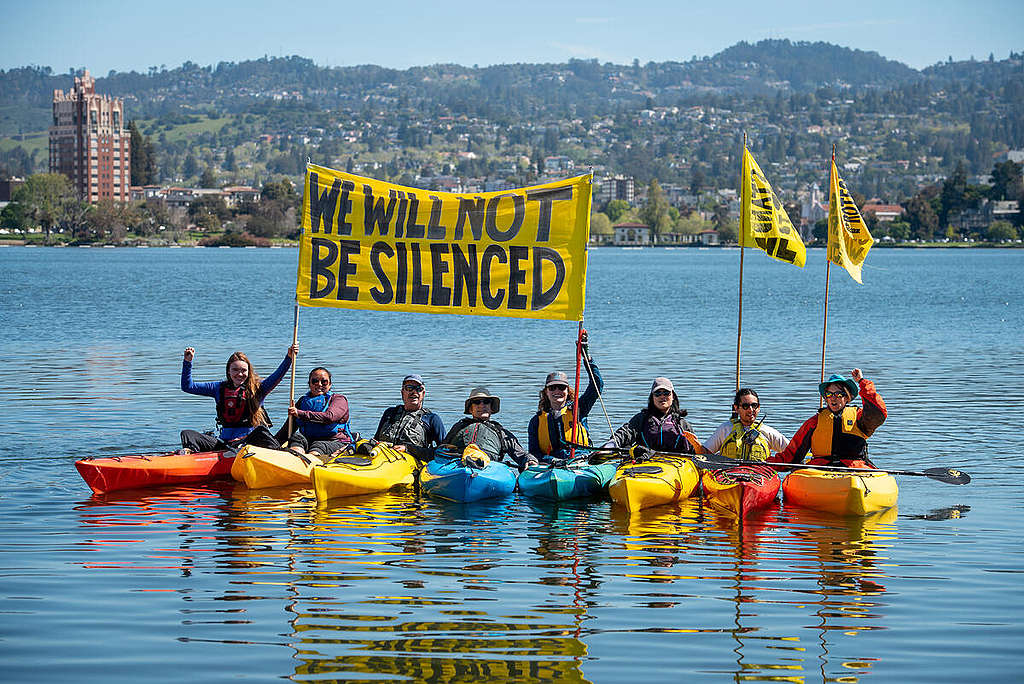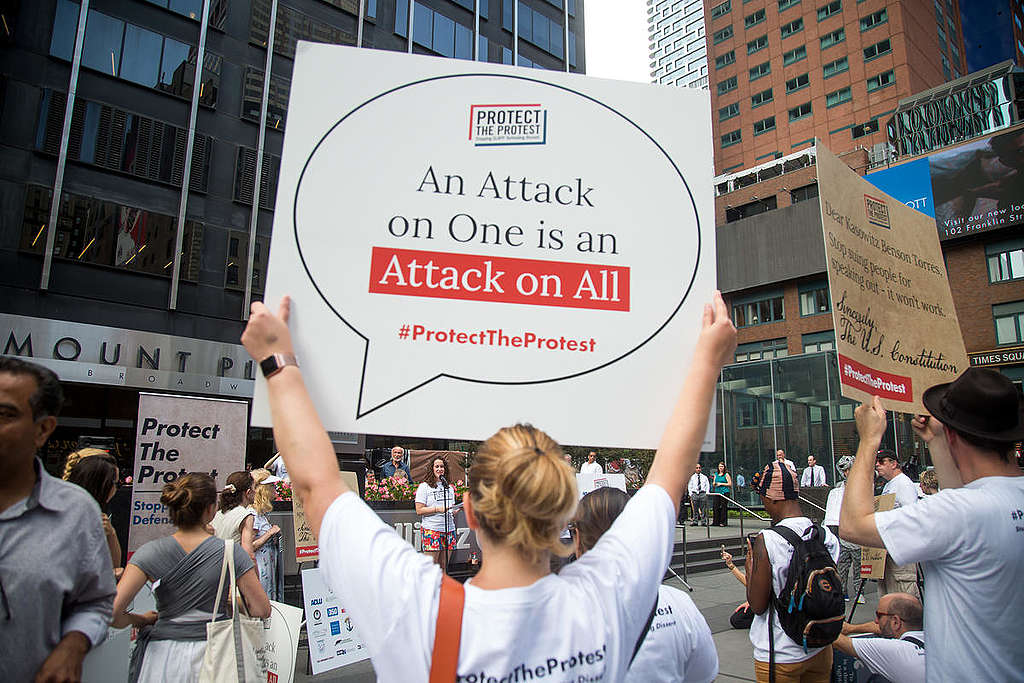Hope creates the conditions for climate action. And climate action nurtures hope. Just as hope and action have a reinforcing relationship, so do fear and silence.
The polluting corporations who put profits over people and the planet know this and they use their resources to intimidate, to instill fear, and ultimately to silence the people directly impacted by their short-sighted, extractive greed.
SLAPPs, a type of abusive lawsuit, are a key tool used by corporate power to suppress free speech and people power. These cynical lawsuits can force non-profit organizations like Greenpeace International to divert precious resources away from campaigning for a more just and sustainable society. Perhaps even worse, SLAPPs can intimidate targets from challenging powerful corporations in the future.
Every SLAPP, regardless of the defendant, is an attack on everyone who believes in the power of free speech and the right to peaceful protest. No one should be bullied for speaking up on behalf of people and the planet.
But corporate bullies beware!
In a massive win for free speech, a US federal court recently dismissed a seven-year lawsuit brought by Resolute Forest Products against a number of Greenpeace staff members and entities, including Greenpeace International and Greenpeace USA. The Canadian logging company sued the Greenpeace defendants for CA $100 million in an attempt to silence and bankrupt them, after criticism of its unsustainable forestry practices.
Let's take a closer look at SLAPPs so you can recognize them when you see them:
What does SLAPP stand for?
SLAPP stands for "Strategic Lawsuit Against Public Participation." These lawsuits are used by corporations attempting to diminish or even stop public participation in civil society. SLAPPs often lack any kind of merit, and don't need to result in a legal victory to achieve the outcome desired by corporate bullies.

SLAPPs waste time and cause financial and sometimes psychological harm to targeted individuals and organisations who have to hire lawyers and engage in costly legal battles, sometimes to the point of facing bankruptcy. These lawsuits attempt to silence free speech and limit peaceful dissent by using litigation as a tool for deterring non-violent protest and even documenting and bearing witness.
How do corporations use SLAPPs to hurt those devoted to the public good?
For corporations that deploy SLAPPs, the focus is on the legal process as opposed to the outcome. According to Public Participation Project, "SLAPPs are effective because even a meritless lawsuit can take years and many thousands of dollars to defend."
Moreover, many SLAPPs include claims for extremely high amounts of money. Even if those claims are baseless and doomed to fail, the fact that the outcome of a trial is never completely certain means some SLAPP targets feel they have no choice but to retract their statements.
Beyond the time and money wasted litigating the case itself in the short term, corporations who use SLAPPs will hope that those who defend the planet and public interest will be apprehensive from that point forward when it comes to standing up against wrongdoing for fear of incurring another lawsuit.
The real goal of a SLAPP is intimidation.
How many SLAPPs are happening around the world?
The short answer: Far too many!
The report "SLAPPed but not silenced: Defending human rights in the face of legal risks" published in 2021 by the Business & Human Rights Resource Center, documented 355 legal cases around the world bearing the hallmarks of SLAPPs since 2015. These frivolous cases were brought or initiated by business actors against organisations or individuals and groups related to their defence of human rights or the environment.
Nearly three-quarters (73%) of these SLAPPs were brought in countries in the Global South, with the highest number in Latin America (39%), according to the report. Latin America is followed by Asia and the Pacific (25%), Europe & Central Asia (18%), Africa (8.5%), and North America (9%). As the authors recognise, their tally of 355 SLAPP suits is a snapshot which is "limited but illuminating." The true scale of the problem is certainly much larger. Another report, co-published by Greenpeace International for the Coalition Against SLAPPs in Europe, identified 570 SLAPP cases over a 10-year period in Europe alone. And filed cases are only part of the problem: heavy-handed threatening letters may be enough to intimidate or silence public watchdogs.
In recent years, the fossil fuel industry has used SLAPPs widely: A 2022 report from EarthRights International found the industry used SLAPP tactics to target more than 150 people and organizations over the preceding 10 years.

What legal protections exist against SLAPP lawsuits?
It's not a secret that SLAPP suits are a threat to free speech and the right to peaceful dissent, but they have been on the rise in recent decades. Anti-SLAPP protections lag behind the damage being done, but there are signs of hope for those who won't be silenced by powerful corporations.
In the United States, Congressional representative Jamie Raskin, a Democrat from Maryland, introduced the country's first federal anti-SLAPP bill. If passed into law, the federal bill would build upon the more than 30 anti-SLAPP laws already existing at the state level in the US.
"Here we are, more than six years from when the first SLAPP was filed against us, still forced to invest time and resources into these legal battles that otherwise would have been used to protect communities and the environment from toxic pollution and the existential threat of climate change," Greenpeace USA Deputy General Counsel Deepa Padmanabha said at a US Congressional hearing called by Raskin in September 2022 to discuss the threat of SLAPPs. "While our window to fight the climate crisis continues to shrink, we have to win because the voices of those who protect our planet and our communities cannot be silenced."
In April 2022, the European Commission unveiled a draft directive that would require EU Member States to put protections in place against SLAPP lawsuits. The Commission's draft includes measures to allow defendants to ask for SLAPPs to be thrown out of court at an early stage, to sanction those who engage in SLAPPs, and to minimise the damage caused to SLAPP victims.
The Commission's proposal was well received by the CASE coalition, in which Greenpeace International and a range of organisations representing journalists, activists, whistleblowers, rights defenders and other watchdogs have been calling for an EU anti-SLAPP directive. The focus of the directive would be cross-border cases, but any EU law would also be expected to spark national measures against SLAPPs. Unfortunately an amended text put forward by the Swedish Presidency of the EU Council threatens to water down and undermine the Commission's proposal.
In order to put a long overdue stop to SLAPPs, legal protections around the world are needed. In the meantime, it's important to remember that any organisation or individual fighting a SLAPP does so in solidarity with an entire movement.
What do you do when facing a SLAPP?
Being no strangers to the dangers of SLAPPs, Greenpeace USA created an anti-SLAPP toolkit to empower anyone faced with such a threat. It is built around three core action items:
Raise awareness: Most folks have never heard of SLAPPs and that lack of awareness works in favor of corporate bullies. It's important to educate about the frivolous nature of these attacks.
Raise money: Until proper anti-SLAPP legislation is in place, there is no getting around the existential threat posed to many organisations by high legal fees.
Raise your voice: While a SLAPP may be decided in a courtroom, don't underestimate the court of public opinion when planning a defence. Being vocal about active SLAPPs can catalyze the creation and adoption of needed legislation. Moreover, negative attention and loss of social license for those wielding SLAPPs may even make them less likely to use this tactic in the future.
Check out the entire anti-SLAPP toolkit to learn more about how you can defend yourself or your organisation against a SLAPP and how you can support those facing such attacks.






